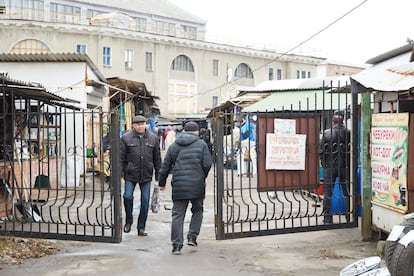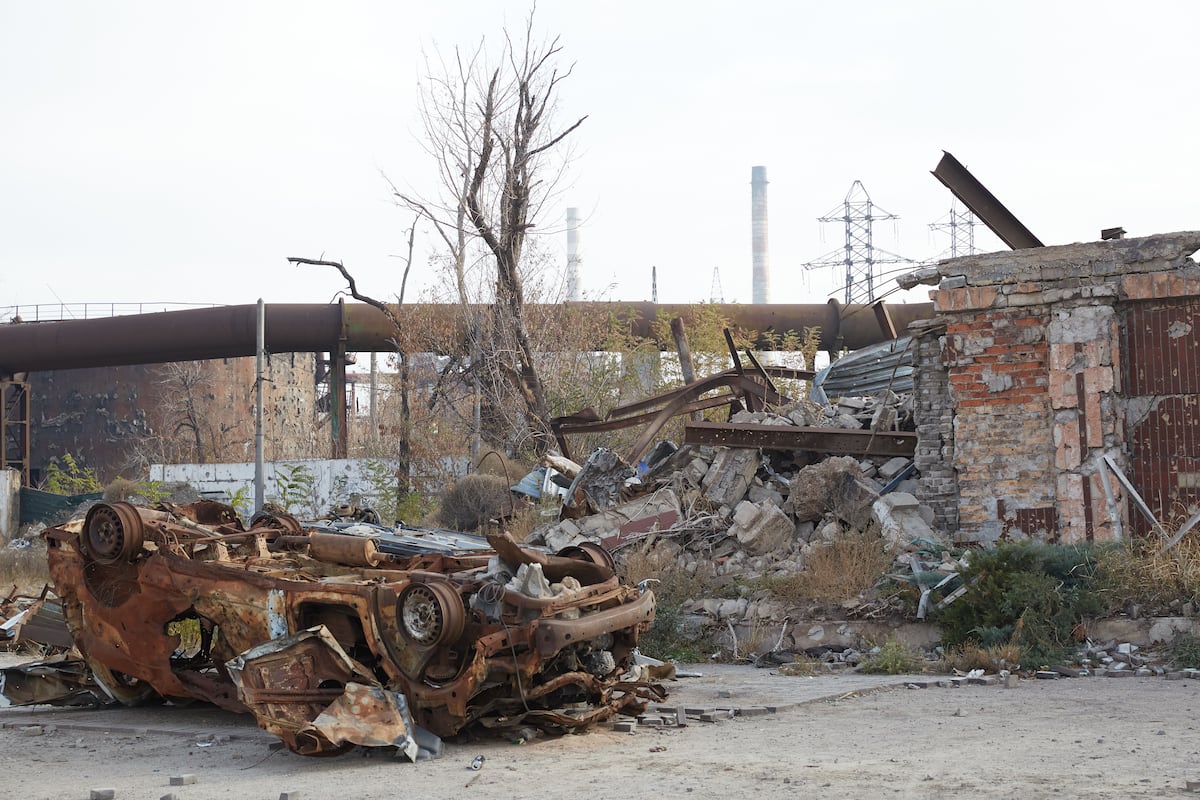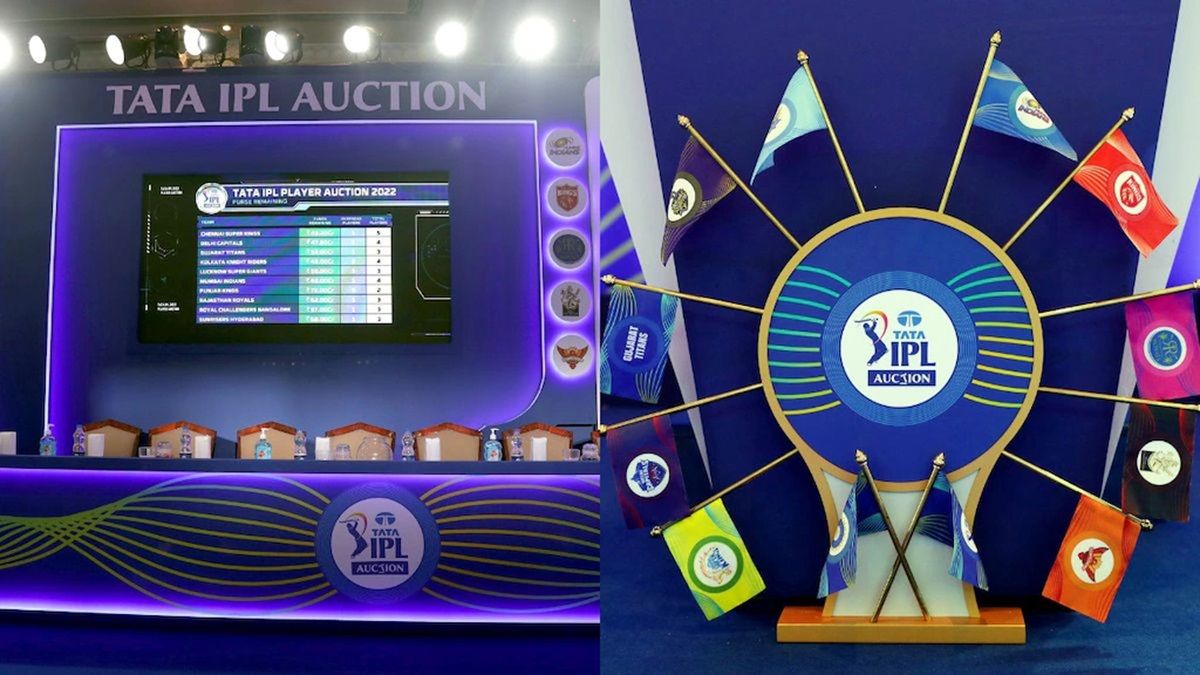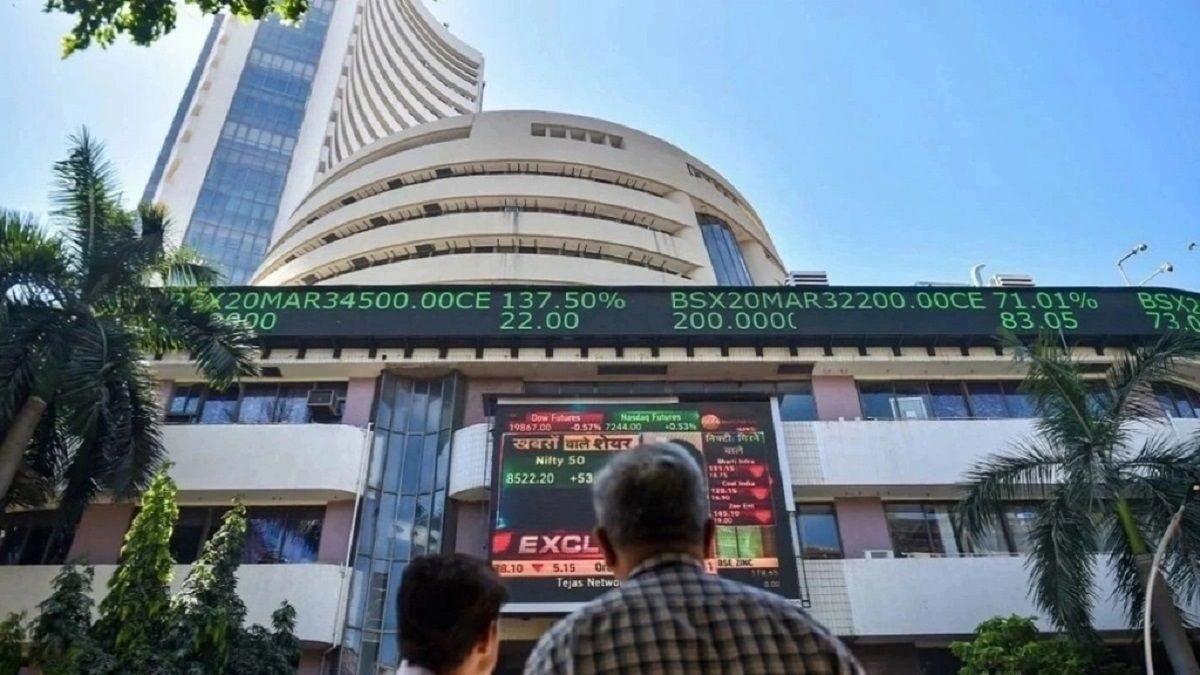Mariupol fell at the end of May 2022, after almost three months of Russian siege. More than 80% of their homes were destroyed and thousands of civilians were killed in the offensive on the eastern Ukrainian city. The total number of fatalities is not yet known. A thousand days after the start of the war, thousands of workers from all corners of Russia rebuild the city. On the doors of some homes, holed by shrapnel and projectiles, the warning “People!” is still painted, with which civilians indicated that they were hiding helplessly there. The ruins of the impressive Azovstal metallurgical complex rule the city. The ruling Russian authorities now want to demolish it to build a technology park, although their plan is to make the city a beach destination for Russians. Mariupol had more than 420,000 inhabitants before the war. Today there are many fewer. In some downtown streets life boils, others are a wasteland.
Three women walk at night near the ruins of a kindergarten in the Azovkoltsó suburb. “[Antes] “Everyone spoke Ukrainian, Russian, whatever you wanted, no one harassed us,” says Raisa Ivanovna, 75 years old. The war surprised them and their families. “I didn’t understand if it was a dream. We woke up to bombings. We spent a month in the basement,” adds his sister Nina, 68.
The women were evacuated to Berdiansk, southwest of Mariupol, already on the Russian side, without incident. Upon their return to Mariupol they received the Russian passport in 10 days. Today they see the reconstruction of the city with optimism. “There are shops, pensions arrive little by little, there are medicines in pharmacies,” Raisa declares. None of them can answer if they feel they have been liberated: “From whom? It’s like a dream, we don’t understand anything.” Today they only ask for “peace, peace and tranquility” from the future.
Complaints in the new neighborhoods
Russian President Vladimir Putin briefly visited Mariupol one night in March 2023. He toured the Nevsky district, a newly built neighborhood that symbolizes for the Kremlin its effort to restore what it calls its “new territories.” Moscow has allocated some 1.3 trillion rubles – 13 billion euros – for its repair until 2027, according to independent Russian media.
“It looks good on the outside, but it’s very bad on the inside,” says a neighbor who wants to remain anonymous. His lifelong home burned completely. The woman shows the block, which does not have an elevator: “The walls are made of plaster, they have holes, and the entire bathroom is plastic,” she says before emphasizing that they gave it to her empty. “I lost everything. I had a renovated three-bedroom apartment, with my furniture and my clothes,” the woman says.
The other neighbors join in the complaints. A couple arrives at the apartment with a small child and is ironic about the quality of the building, whose floor the neighbors themselves have repaired. “I hate this world. I want to return to my Mariupol, to my apartment. “I’m sorry, guys,” a third neighbor, over 60 years old, visibly affected, laments before closing the door.
Pro-Russians in Mariupol
However, other residents of Mariupol celebrate the arrival of Russian troops. “I was liberated, I didn’t feel like an equal,” says Alexánder, owner of a hostel on the coast, during dinner. Originally from the Russian city of Nizhny Novgorod, this sailor moved to Mariupol in 2000 after marrying his wife. “After 2014—the year of the Maidan protests and the Donbas war, in which Ukraine was able to retain control of the city—I began to feel like I had become a second-class citizen,” he says. Alexánder denounces that the authorities did not recognize his Russian driving license despite being international and believes that if he had had a trial, he would have lost it because of his ideology.
The war surprised him while traveling in Russia. His wife and daughter were trapped in the fighting and he lost contact with them. After an odyssey that included hundreds of kilometers on a bicycle, he obtained a pass from the Ukrainian forces and everyone hugged again. Three days earlier, his wife had been wounded by shrapnel.
Today the Russian flag and that of the tsarist empire fly on the facade of his hotel. With the city under Ukrainian control, his house was painted in the three colors of his country, red, blue and white. “There was never a complaint,” he says. “It’s not just a flag. I love Russia,” Alexander continues.
Viacheslav, 70, walks through the center of Mariupol. He is pro-Russian, but regrets that the authorities only offer up to 7,000 rubles – 70 euros – per square meter for repairs and believes that “they are going to get hit with taxes” in the future. He has four apartments that he wanted to rent “so as not to work” and move to Alicante, although he believes that in Spain “they discriminate against the Russian-speaking population.” He says the same about the Ukrainians, whom he accuses of imposing the language in the administration. “I hate the jojlí —a derogatory name used by Russians against Ukrainians—there was forced Ukrainization here.”
Vyacheslav has four children. He maintains contact with three: one who is a minor, another who participated in the pro-Russian protests of 2014, and another who lives in the Ukrainian area, in Kharkiv, whom he considers “neutral” because everything happens. You don’t talk to the fourth. He is chief of firefighters in kyiv. “Too much polarization,” he says.
In the center of the city there seem to be more soldiers than usual. They are actors from Russia. Director Alexander Repenko is filming a series for state television, Pervy Kanal. It is about security agents who investigate the sabotage of young Ukrainians. “They have been brainwashed for years. If before it was a pro-Russian city, in 2022 it was absolutely pro-Ukraine,” he asserts.
Repenko calls the documentary propaganda 20 days in Mariupolawarded with the Oscar, and reiterates that the Kremlin’s mission is to “denazify Ukraine.” Asked about the exchange of Azov battalion fighters for the politician and friend of Putin Viktor Medvedchuk, the director contains his disappointment: “We were waiting for his trial. “It was one of those political agreements that, unfortunately, cannot be avoided.”
Donetsk, a ten-year odyssey
The trip to Donetsk is this journalist’s return to the city a decade later. In January 2014, no one in eastern Ukraine was talking about joining Russia, although they were wary of the Maidan protests. After the flight of President Viktor Yanukovych, there were some demonstrations in the east of the country, but they ended in nothing. When they died out, Russia sent paramilitaries to encourage the rebellion. “We understood that the demonstrations made no sense and were a dead end. There was no willingness to go to the end, in Donbas there live workers, simple people, with little initiative and very obedient,” admitted the then head of communications for the paramilitaries, Sergei Tsiplakov, in the book 85 days of Slaviansk.
The so-called Donetsk People’s Republic is currently undergoing harsh deindustrialization. You see young people on the street, but many factories and offices are abandoned and prices have skyrocketed. According to the newspaper New Russiathe average salary is around 27,000 rubles per month (270 euros) compared to 77,000 rubles in Vladivostok (770 euros).
“Many immigrants have come, but many of ours have left or are at the front. Many people have died,” says Vyacheslav Morskoi, a 46-year-old Russian bricklayer who moved to Donbas as a young man. “I’m glad to be in Russia, Ukraine has never existed,” says Morskoi, who works from Monday to Sunday to feed his family. Former footballer, he remembers with passion when the Shakhtar Donetsk stadium hosted Real Madrid and Barcelona in the Champions League.
Days before Russia began the 2022 offensive, the authorities in Lugansk and Donetsk decreed the mobilization of men between 18 and 55 years old. Thousands were immediately sent to war in Donbas and Mariupol. Morskoi was not called up because of an eye problem. Although he defends the mobilization, he denounces how it was carried out: “You need at least a month to prepare, to learn to shoot,” this worker laments. “They caught people in the markets. We were mobilized by force, but our Putin gave them shit [a los responsables]. They got screwed for this and it was over.”
The city lives under a curfew, but young people have a couple of bars where they can spend the weekend with an exquisite local beer. Yegor and Mark, 18, are musicians in the band Out of mind. “If the Russian offensive had not started, we would have been crushed. 2014 would have happened again,” says Yegor. His friend clarifies: “Was it necessary [la guerra]? “We don’t know one hundred percent what would have happened, but expect the best and prepare for the worst.” The two refuse to enlist on their own initiative. “No way, we wouldn’t go voluntarily,” Yegor responds, although he affirms that he wouldn’t flee in the event of a mobilization either. “We have our own goals in life,” points out his colleague.
Other young people think like them. At the bus station, Vania and her friends, 16 and 17 year old basketball players, don’t want to go to war either. “Of course not,” they emphasize, although they are grateful that the city lives much more calmly “thanks to the fact that the front has moved.”
Sergei, a 55-year-old contract soldier, fought in 2014 as a volunteer with the separatists. “Now a war is being fought between good and evil,” he emphasizes during a religious service in the Cathedral of the Holy Transfiguration. “The homosexual minority comes to us from Europe. This is wrong. A man must be a man, a woman must be a woman,” he says after accusing kyiv of being “a puppet” of the West.

The cathedral has just been repaired from the impact of a Ukrainian projectile. The priest Nikolai thinks that war is a test from God for everyone. “Nobody asks ordinary people. The Government decided it this way, we can only live in these circumstances and accept them,” says the religious before emphasizing that we should not hate anyone on the Ukrainian side: “For a Christian there is the principle of hating sin, but loving sinner”.
Next to the front
If calm reigns in Donetsk, in Gorlovka, located a dozen kilometers from the front, the situation is hot. The city has been part of the separatist zone since 2014, but the contact line crossed it and has barely moved since 2022. The sound of explosions and artillery fire accompanies the entire night and does not subside during the day, and the evil time is celebrated because there are fewer drones flying over the city.
Górlovka had more than 240,000 inhabitants before the war. A Ukrainian bombing has left it without electricity. The city is plunged into absolute darkness, except for a few stray windows where autonomous generators operate. Authorities say some 60,000 residents have been affected — meaning only a quarter of the population remains — and say the blackout will last another week. “This is the first time this has happened to us in recent years,” they say at the hostel.
“We are afraid, but we live,” says a 35-year-old clothing seller from the local market. He has an 11-year-old daughter, but he rules out leaving home. The day before, an artillery attack left several victims hundreds of meters from their stall. “Three years ago there were no bombings in the city. Now people are afraid, they don’t come to the market. Before, our children went out to the playground, now they study at home.”
Liliana sells hundreds of sweets and candies inside the main market. Like many other neighbors, it wants to remain part of Russia. “We have been living in this hell since 2014 on the front lines. If there is a war, the military fights on the front, they do not attack the population,” says the woman, who has a daughter on the Ukrainian side. “I haven’t been able to see her since the war started. “She’s a doctor and they don’t let her leave.”








